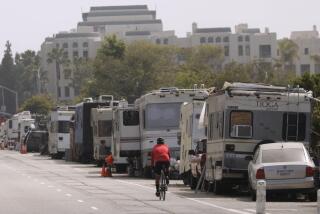Ventura Bans Camping at Public Parks, Beaches
- Share via
VENTURA — First they prohibited panhandling. Then they banned camping in a flood plain.
Now, in an ongoing effort to bar homeless people from their historic west Ventura stomping ground, the City Council has approved a new law forbidding camping at public parks and beaches.
The 6-0 council vote Monday evening came nine months after Ventura’s homeless population was flushed from the Ventura River bottom by floods, leaving some to take up residence in city parking lots, alleys and parks.
Their semi-permanent presence in the newly spruced-up downtown has angered some merchants and turned off some tourists, prompting city leaders to enact the ban.
“Everybody in town is saying, ‘Come on guys, clean it up,’ ” Councilman Jack Tingstrom said before the meeting. “It’s terrible. They are using all the plants and bushes as a toilet. It’s stinky, and we have to stop it.”
The idea is not a new one. Cities throughout Southern California have outlawed public camping in parks, starting with Santa Barbara in 1979. Court challenges were ultimately unsuccessful.
Ventura city officials have considered the new law over the last year, but stopped short of a no-camping ordinance until housing alternatives could be found.
Now, they say, housing and counseling programs launched after the floods have filled that void. City officials specifically point to the creation of the Homeless Employment Resource Operation, or HERO program, which is now providing temporary housing at Camarillo State Hospital for 25 people.
“It is not as though we are trying to throw people out,” City Atty. Peter Bulens said. “We also have other avenues available for these folks to find a place to stay.”
But the Camarillo shelter is slated to close Jan. 31. City officials say they are working with county agencies to establish a long-term regional shelter and are considering other options.
Mayor Tom Buford acknowledged after the council vote, however, that the plan for a replacement shelter is in its infancy. “I don’t know that anyone knows what we’re going to do after Jan. 31. There’s no doubt that is an issue.”
*
And that has at least one homeless advocate worried that Ventura’s ban will push the homeless out before long-term shelter is available.
“The problem there is that the Camarillo facility is slated to close at the end of January,” said Clyde Reynolds, executive director of the Turning Point Foundation, which provides services to Ventura’s homeless.
“I understand that the city is trying to take some action to reduce the problem, but I think taking a single action to make it unlawful is not going to solve the problem,” he said. “My sense is that people will keep moving around. If anything, they are going to end up on private property.”
But after the council vote, HERO Executive Director Bob Costello said the city had done the right thing because the situation is urgent. He said he knows of 26 homeless people who have died of substance abuse on local streets or in cars since the January floods.
“The people out there are killing themselves,” he said. “We want to get to them now, rather than wait.”
Modeled after a Santa Ana law upheld in the state Supreme Court earlier this year, the new ordinance prohibits camping in parks, on beaches and in other public areas. It also bans storage of personal property in public areas.
Police officials responsible for enforcing the law have wrestled with the issue for years. And they say the ban will help to alleviate the city’s homeless problem.
“Idle threats don’t do it,” said Sgt. Carl Handy, who heads the team of officers who regularly patrol the now off-limits river bottom, which once housed most of the city’s homeless population. “You have got to have some teeth in the law.”
By enforcing the ordinance, officers say, they will direct homeless campers to transitional shelters and other services that they may not know exist. “Our ultimate goal will be to direct them,” Handy said. Repeat offenders will be arrested.
*
Since January’s floods, city officials say merchants and visitors to the newly refurbished downtown have complained of homeless people stashing their belongings, urinating and sleeping in public areas.
Some merchants praised the city for taking steps to halt such inappropriate activities, while others described the new law as overkill.
“I think we have overwhelmed ourselves with regulations,” said Franky’s restaurant owner Kris Pustina. “I’m not so sure that a new law is the answer.”
More to Read
Sign up for Essential California
The most important California stories and recommendations in your inbox every morning.
You may occasionally receive promotional content from the Los Angeles Times.










